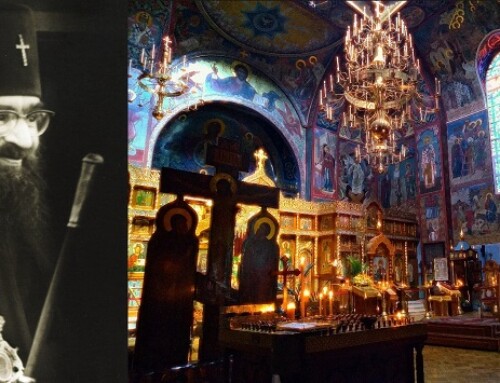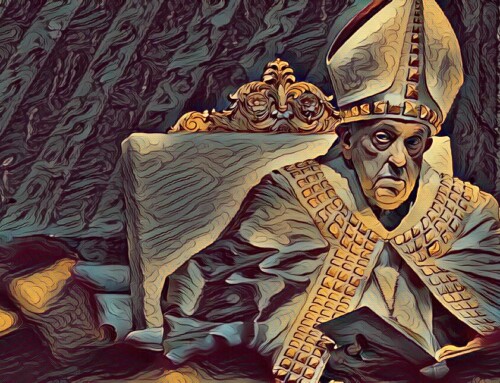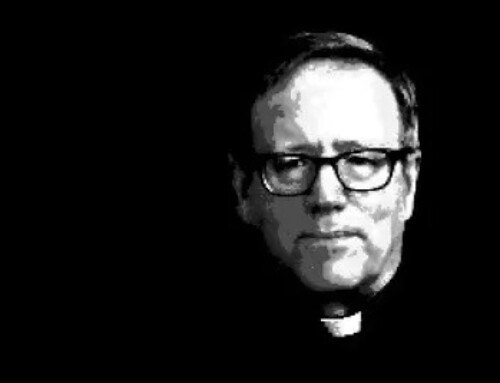First of all, I think it is wonderful and noble for any Catholic to honor and pray for those who died so needlessly in the Orlando massacre, but a Catholic can do this without adopting the vocabulary or the symbols of the modern gay rights movement. As then Cardinal Ratzinger wrote in the 1986 Letter to the Bishops of the Catholic Church on the Pastoral Care of Homosexual Persons: “The human person, made in the image and likeness of God, can hardly be adequately described by a reductionist reference to his or her sexual orientation.” Therefore, by applying such terms as gay, lesbian, or LGBTQ is to do exactly that: it is to define every man and women with same sex attraction – solely by that attraction. This also pertains to the use of such imagery as the rainbow flag which is inherently politically charged: it does not define us, just as calling us LGBTQ indiscriminately and unnecessarily categorizes many diverse individuals by only one aspect of who they are, or may have been. For, there are countless men and women, within the Catholic Church, who once self-identified as “gay,” but do so no longer. Through the Grace of God, we have refused to be defined either by ourselves or by the “gay” community.
In the wake of the Orlando tragedy, James Martin S.J. states that: “…the LGBT community is invisible still to much of the Church; even in their deaths they are invisible.” In the late-1980s and early-1990s, I was living in San Francisco, California as a young “gay” man. While I had unofficially left the Church of my childhood years before, I took notice when I made a last visit to a friend, dying of AIDS, and a Catholic priest arrived to hear his Confession and to anoint him. The priest had been sent by the man’s mother; although my friend lay there rather stinking and spotted with Kaposi Sarcoma, the priest took his hand – and then I left the room. Around that same time, I attended a funeral for a neighbor who had died of AIDS, his parents and family had somewhat abandoned him, but a group of his friends got together and arranged a small prayer service and burial. A local Catholic priest, who didn’t know the poor soul, but was somebody’s friend, agreed to officiate and bless the proceedings. Years later, at the AIDS hospice run by the Missionaries of Charity, I accompanied a friend to visit someone he knew, but had lost touch with, that was now staying at the Hospice; the place was simple, but incredibly clean. Most of the men were too poor and evidently forgotten to go anywhere else; so the Sisters were giving them a place to at least die in dignity. Were these “gay” men invisible?
Martin also states that the Church has created an atmosphere in which the gay community is perceived as the “other.” Partially this is true, but not for the reasons that Martin is proposing. In reality, clerics such as James Martin have made “gay” men and women the “other:” principally in his insistence that everyone must make an “explicit reference” to the LGBT community. He wants us to be categorized, to be labeled, to be confined within his own world-view. This is evidenced in Martin’s almost neurotic contention that the Church can only “stand with” the LGBT community, by naming the community – by naming every one of us – by naming you and by naming me. But with what name? And, is this a name that we want or is it one that has been imposed upon us by the likes of the intolerant do-gooder?
James Martin S.J. – here is one man who refuses to be named. Ever since I was a scared, lonely, and confused little boy, I have been confronted by people who repeatedly wanted to label me. When I was a kid, they called me all sorts of “gay” slurs. When I went to San Francisco as a still scared, lonely, and confused boy, now 18 years of age, a priest tried to comfort me as he said: “You were born gay…this is where you belong.” After over a decade of continued loneliness as a “gay” man, after seeing friends die of AIDS, after becoming more and more desperate to find love, I decided to leave. Seeking guidance, I spoke with another priest, he told me: “But you were born gay…you should go back.”
Like you, these were compassionate men; they were the priests willing to do what few, if any, were willing to do at the time– to touch the dying and to bury the victims of AIDS. But, also like yourself, they had a penchant for reducing all of us into one group – or into the artificial and clunky LGBTQ bundle. There were moments, when this attitude could be both paternalistic and reverential; for they saw us as their slightly mischievous sheep, but also as cultural and social rebels who were taking on the Catholic institution – something that all of them viewed as a highly flawed organization which they outwardly served, but constantly criticized.
Only, I was truly invisible to these men; for they could only see a “gay” person – a member of the LGBT community, someone who had been born “gay,” someone who needed to accept their gayness – no matter how bad it got.
Then, I met someone who was infinitely caring and sympathetic, but he also didn’t look at me as a “gay” man or a member of the LGBT community; he looked at me as a man, and as a member of his community, as a “human person, made in the image and likeness of God.” This saintly disciple of Christ was Fr. John Harvey. And he once said: “Our uniqueness as persons is not rooted in our sexual inclinations, but in other intellectual, volitive and bodily characteristics. Our personhood is much more complex than our sexual identity. To center personal identity in a homosexual inclination is to accept a false identity.”
Often, I remember the men who died of AIDS, over 300,000 “gay” men in the US alone have succumbed to the disease, and I knew just a few. But, they came from different parts of the country, from different ethnic backgrounds, and from different creeds, but, for the most part – we all shared an intense desire to be loved. In his Introduction to Fr. Harvey’s 1987 book “The Homosexual Person,” Fr. Benedict Groeschel wrote: “If there is any group of people who are aware of the painful need for love, it is those who, for want of a better name, are called homosexuals. In working with this part of the human family for more than a decade, I have come to appreciate that they more than most others experience a profound hunger for love, for love that does not fail.”
Why many of us looked for this “love” within a collective identified as the “gay” community is a complex and difficult question. And, the where, and with whom, we sought to fulfill this love – is not what ultimately defines any of us. Instead, our true fulfillment is in how we found, not our identity, but God. James Martin S.J. – look beyond “gay” into the deeper realms of our humanity and into that part of us, as Fr Groeschel wrote, is our “…hunger for God.” We do not want your labels, we want what every man and woman desires: a chance to move beyond ourselves, so we too might one day understand and know God.





Beautifully written! Sexual attraction is a highly complicated subject. However, I love how you engage in the topic from the perspective of not labeling people for a single aspect of their make-up. The label that should define people is more elemental than race, ethnicity, sexual orientation, or even creed. We are all children of the same Creator. We all deserve love and dignity as such. How we feel drawn to find that love fulfilled should be fostered by our relationship to our Creator. The main way that people develop that relationship is through spiritual guidance from their pastoral caregivers. That pastoral care must remain consistent with the teaching of Christ and the apostles. We have been warned in Holy Scripture about being careful where we get that pastoral care from. That is why Holy Mother Church is so uncompromising on Apostolic Succession and the concrete doctrine of the Catholic Church. Although times seem to change with society’s view of what is fashionably acceptable, the teachings of Christ are forever! Thank you for your ministry and continued love and respect for those that have lost sight these things. They too are deserving and in extreme need of Christ’s love!
I would say that you know and understand God far better than I do. And yes, the “Identity” of the Child of God, is the only one any of us need.
Very powerful. Unfortunately, Fr. James Martin is openly gay and leading many off the precipice. I have been reading St. Faustina’s Diary to get a better understanding of mercy, and that mercy that God so much desires to give us requires work on our part: to suffer with Christ in His Passion, to be purified of sin, to pray fervently for graces, and to repent of wrongdoing. People like Fr. James Martin want to be “compassionate” and “merciful” without the works, without the suffering, without the repentance required to receive God’s mercy. And when this is pointed out to him, he calls it an ad hominem because he knows he has no substance. He is very sneaky and collusive, but once in a while he lets his guard down – like when he displayed the Devil’s Horns while introducing Metallica on the Colbert show a couple years ago.
The new Catholic fad – Mercy without Justice.
Amen. Brother in Christ. Amen.